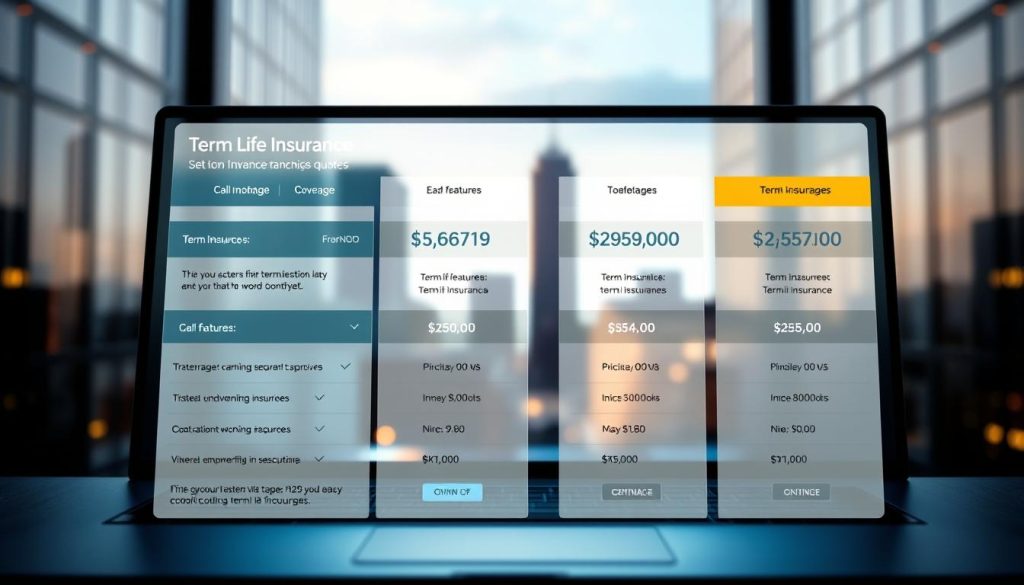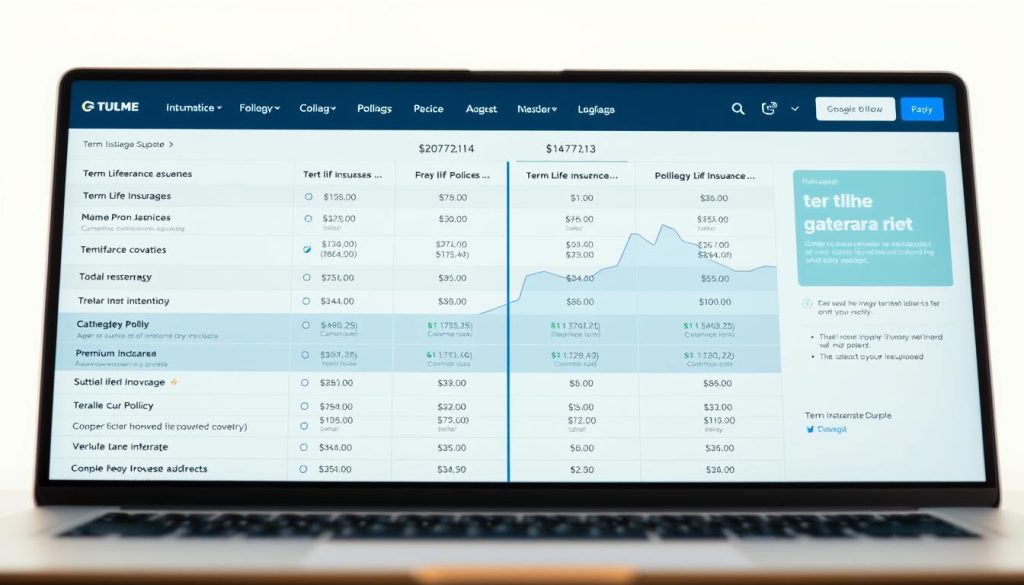Smart & Simple Term Life Insurance Comparison
Comparing Term Life Insurance Quotes to find the right financial protection for your family doesn’t have to feel overwhelming. Today’s digital tools let you explore coverage quickly and confidently, with no agents or paperwork required. Modern platforms simplify the process, allowing you to review personalized estimates in minutes.
Many providers now offer instant calculators that ask basic questions about age, health, and desired coverage length. These systems analyze your inputs to generate tailored results. You’ll see potential premium rates and policy details side by side, making it easier to spot the best value.
Online comparison shopping eliminates endless phone calls. Instead of contacting companies individually, you enter your information once. Multiple quotes appear instantly, saving hours of research. This transparency helps families balance budgets while securing meaningful protection.
Understanding how these tools work empowers smarter decisions. Most platforms prioritize security, keeping your data private while delivering accurate estimates. With clear breakdowns of costs and benefits, you can focus on what matters: peace of mind for the future.
Key Takeaways
- Digital tools provide instant quotes from multiple providers with minimal effort
- Basic personal details generate personalized coverage estimates
- Comparing rates online helps identify affordable premium options
- Secure platforms prioritize privacy while simplifying decision-making
- Transparent cost breakdowns make balancing budgets easier
- No-obligation quotes allow flexibility in exploring policies
Understanding Term Life Insurance and Its Benefits
Securing your family’s future doesn’t require permanent commitments. Temporary policies offer protection during critical years when financial responsibilities peak, like raising children or paying off a mortgage. These plans balance affordability with substantial safeguards, letting you prioritize current needs without lifelong obligations.
How Temporary Coverage Works
This type of policy lasts 10-30 years, matching common debt timelines. Unlike permanent plans, it focuses purely on protection, with no investment components or cash value. Premiums stay consistent, and rates often start below $35 monthly for $250,000 in coverage.
Supporting Family Stability
If the unexpected occurs, beneficiaries receive tax-free funds to replace income, clear debts, or fund education. One parent shared: “Knowing our kids could stay in their school district brought immeasurable relief.” This safety net ensures major goals remain achievable, even during difficult transitions.
Families appreciate the clarity, coverage ends when obligations diminish. Renewal options exist, but locking in rates early typically saves money. By aligning policy lengths with specific needs, you avoid overpaying for unnecessary long-term features.
Compare “term life insurance quote” Options Online
Exploring your financial safety net just got simpler. Modern comparison tools let you review tailored estimates from major carriers in minutes, no endless forms or sales calls. These platforms analyze your unique situation to match you with suitable plans.

How to Get Personalized Quotes
Start by entering basic details like birthdate and ZIP code. Honesty matters: accurate health history and lifestyle details yield realistic premium projections. One user noted: “Listing my gym membership helped lower my final rate by 12%.”
Most systems show preliminary costs instantly. For precise numbers, some providers request additional medical details through secure follow-ups. This two-step approach balances speed with accuracy.
Overview of Top Providers
Leading carriers like Banner Life and Protective offer distinct advantages. Banner frequently tops affordability charts for 20-year plans, while Protective excels in flexible underwriting for active lifestyles. Consider:
- Financial strength ratings from AM Best or Standard & Poor’s
- Specialized plans for high-risk occupations
- Digital tools for policy management
Rates can vary 20-40% between companies for identical coverage. Comparing three to five options helps identify patterns. Locking in rates early often proves smarter than waiting for perfect health metrics.
Factors Affecting Your Term Life Insurance Rates
Understanding what shapes your policy costs helps you make informed choices. Multiple elements work together to determine your monthly payments, from personal details to coverage preferences.

Coverage Amount and Premiums
The death benefit size directly impacts costs. A $250,000 plan might start near $32 monthly, while $1 million plan could triple that amount. Carriers balance risk exposure with your requested protection level.
Policy Duration and Age Considerations
Locking in rates for 20 years often costs less annually than shorter terms. One financial advisor notes: “Clients securing coverage before 35 typically save 45% compared to those waiting until 45.” Longer commitments provide predictable payments during critical financial years.
Impact of Health and Lifestyle Choices
Medical history and daily habits significantly influence approvals. Non-smokers generally see rates 60% lower than tobacco users. Hazardous hobbies like rock climbing may require specialized plans. Some carriers offer guaranteed premiums despite future health changes.
Annual check-ups and maintaining healthy habits can lead to better rates over time. Many providers re-evaluate discounts during policy reviews, rewarding sustained wellness efforts.
Choosing the Right Life Insurance Company and Policy
Selecting the best provider for your family’s security involves more than just comparing prices. Trustworthy partners deliver consistent support through every stage of your coverage journey. Start by researching how companies balance financial stability with personalized service.
Evaluating Insurance Company Reliability
Top-rated carriers like Guardian and State Farm maintain strong ratings from agencies like AM Best and Standard & Poor’s. These grades reflect their ability to pay claims decades into the future. One policyholder shared: “Knowing our provider has an A+ rating helped us sleep better at night.”
Check customer satisfaction scores through resources like J.D. Power surveys. Low complaint ratios often signal smoother claims processing. Digital tools from many insurers now let you track application status in real time.
Understanding Policy Terms and Features
Look for conversion rights allowing shifts to permanent coverage without new medical exams. Some products include premium guarantees locking rates for 20-30 years. Others offer riders for critical illness or disability protection.
Match your needs to policy lengths covering major milestones like college tuition payments. A financial advisor noted: “Families often underestimate how adjustable term lengths can align with changing priorities.”
Licensed agents help navigate complex options while avoiding unnecessary add-ons. Prioritize companies offering transparent explanations of fees, exclusions, and renewal processes.
Navigating Policy Options: Term vs. Whole Life Insurance
Financial safety plans come in different shapes. Two main types offer distinct approaches: temporary protection with fixed costs and permanent solutions with built-in savings. Let’s explore how these options work for various life stages.
Key Differences in Coverage Structure
Temporary plans last 10-30 years with locked premium rates. They focus purely on financial protection without savings components. Permanent options provide lifelong security while accumulating cash value that grows tax-deferred.
| Feature | Temporary Coverage | Permanent Coverage |
|---|---|---|
| Duration | 10-30 years | Lifetime |
| Premiums | Fixed during term | Fixed for life |
| Cash Value | None | Grows over time |
| Typical Cost | $30/month | $250/month |
Switching Coverage Types Later
Many temporary policies include conversion rights. This lets you switch to permanent protection without new health checks. A financial planner advises: “Young families often start with affordable coverage, then convert part of it when their budget allows.”
Conversion windows vary by provider; some allow changes anytime, others only during the first 10 years. This flexibility helps adapt to career changes or inheritance opportunities while maintaining crucial safeguards.
Term Life Insurance Quote Conclusion
Digital tools transform how families safeguard their futures. By comparing personalized estimates, you identify plans matching both budget and needs. Locking in rates early often leads to significant savings, especially when health profiles remain favorable.
Quality protection balances affordability with reliability. Prioritize carriers with strong financial ratings and responsive customer service. These factors ensure smooth claims processing when loved ones need support most.
Remember: coverage length should align with major milestones like mortgage payments or college timelines. Regular policy reviews help adjust protection as responsibilities evolve. One parent shared: “Updating our plan after paying off debt gave us confidence without overspending.”
Take action today using secure online platforms. Compare multiple options side by side, then consult licensed experts for final decisions. This strategic approach delivers peace of mind through tailored safeguards, without compromising financial stability.
FAQ About Term Life Insurance Quote
What distinguishes term life insurance from whole life policies?
Term life offers coverage for a set period (e.g., 10–30 years) with fixed premiums, while whole life lasts a lifetime and includes a cash value component. Term plans are typically more affordable but lack long-term investment features.
How does age influence premium costs for term coverage?
Younger applicants generally secure lower rates because insurers view them as lower risk. Premiums rise as you age, especially after 50, due to increased health risks and shorter policy duration options.
Can I convert my term policy to whole life coverage later?
Many providers, like Prudential or MetLife, offer conversion riders. These let you switch to permanent coverage without a medical exam, but deadlines and fees may apply. Check your policy’s terms early.
What factors do providers consider when calculating quotes?
Insurers assess age, health history, lifestyle (e.g., smoking), occupation, and desired death benefit. A 30-year-old non-smoker might pay /month for 0k, while a 50-year-old smoker could pay triple.
How do I assess an insurer’s financial stability?
Review ratings from agencies like AM Best or Standard & Poor’s. Companies like State Farm and Northwestern Mutual often earn high marks for reliability and claims payment history.
Are medical exams required for all term policies?
Not always. Some providers, like Haven Life, offer no-exam options with simplified underwriting. However, these may have lower coverage limits or higher costs compared to fully underwritten plans.
